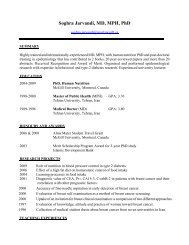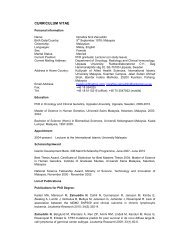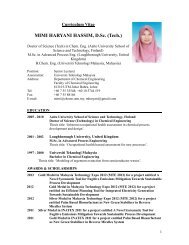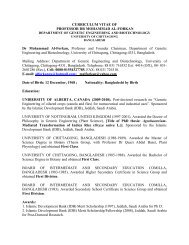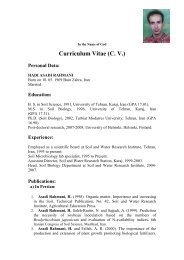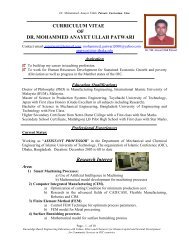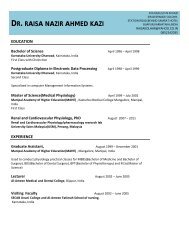Engineering: issues, challenges and opportunities for development ...
Engineering: issues, challenges and opportunities for development ...
Engineering: issues, challenges and opportunities for development ...
Create successful ePaper yourself
Turn your PDF publications into a flip-book with our unique Google optimized e-Paper software.
ENGINEERING: ISSUES CHALLENGES AND OPPORTUNITIES FOR DEVELOPMENT4.2Fields of engineering© Wikimedia commons Blackfriars Bridge, London,under construction.4.2.1 Civil engineeringJose Medem SanjuanIntroductionCivil engineers bring unique services to society – servicesthat involve creative skills <strong>and</strong> personal decisions that carrysubstantial responsibility. Their skills <strong>and</strong> decisions touchthe lives of people around the world in their role as professionalsmanaging the built environment. Indeed, human life<strong>for</strong> the most part depends on these services, which have tobe reliable, safe <strong>and</strong> of high quality to ensure a high st<strong>and</strong>ardof living. If the services of the civil engineer are flawedthen disruption <strong>and</strong> other grave consequences may resultincluding sickness, injury <strong>and</strong> death to, potentially, a largenumber of people. Consequently, civil engineering is oftenbetter known <strong>for</strong> its rare failures than <strong>for</strong> its constant successes.The challenge of sustainable <strong>development</strong> requires ethical<strong>and</strong> technical commitment from the civil engineeringcommunity around the world. Professional ethics areimportant in order to reduce corruption in the industry<strong>and</strong> to adopt a zero-tolerance approach to bribery, fraud,deception <strong>and</strong> corruption in any <strong>for</strong>m; with annual globalexpenditure in the construction industry in 2004 at aroundUS$3.9 trillion, Transparency International estimates that10 per cent is lost through corrupt practices. Many, manymore roads, water systems <strong>and</strong> jobs could be created withthat money.Civil engineers make up a significant proportion, about50 per cent, of all engineers, <strong>and</strong> many are members ofnational, regional <strong>and</strong> international engineering organizations.Solidarity between those in developed <strong>and</strong> developingcountries requires the full commitment of the civilengineering profession in order to help developing countriesraise the st<strong>and</strong>ard of civil engineering services in theirown contexts.The profession faces significant <strong>and</strong> rapid changes. Challengesto public safety, health <strong>and</strong> welfare are becomingmore dem<strong>and</strong>ing. It is there<strong>for</strong>e critical to promote hightechnical st<strong>and</strong>ards of civil engineering through, <strong>for</strong> example,the assurance of mobility of our professionals to enablethe sharing of knowledge <strong>and</strong> access to technology. Outof these beliefs <strong>and</strong> concerns, <strong>and</strong> in order to address theglobal problems specific to civil engineers <strong>and</strong> civil engineering,the World Council of Civil Engineers (WCCE) 1 wascreated in July 2006. 2Some concerns of civil engineeringWCCE members from different parts of the world briefly discussbelow some key questions of concern such as mobility,the decline in civil engineering students, corruption in civilengineering <strong>and</strong> the importance of potable water <strong>and</strong> sanitationin developing countries.MobilityProfessional recognition of civil engineering qualifications isgenerally straight<strong>for</strong>ward at a national level, however acrossa border it can become a serious problem <strong>and</strong>, indeed, civilengineering is not a regulated profession in some countries.Hence mobility continues to be a very difficult issue, despiteinternational accreditation agreements <strong>and</strong> accords.There are many differences within the profession worldwidebrought on by geography, climate, resources, people, history,culture, traditions, idiosyncrasy <strong>and</strong> language. These can varysubstantially even within nations. Also, <strong>and</strong> more practically,modernization of technology <strong>and</strong> techniques have been conductedin different ways according to economic <strong>and</strong> industrial<strong>development</strong>. There are differences too in the content<strong>and</strong> duration of civil engineering studies, some dem<strong>and</strong>ed bylocal context but also because courses are, necessarily, continuouslychanging.Decline in numbers of civil engineering studentsIn many countries, the number of students that choose a civilengineering career is in decline. Success patterns in societyhave changed <strong>and</strong> many prospective students believe that anengineering career is a more difficult route to success thanothers. This perception may be due to obsolete study plans,perceived high work commitment, perceived low salaries, alack of research careers, or a view that civil engineers are techniciansthat do not get to the ‘top’ compared to, say, businessor management graduates. But it is also because civilengineering has not recently been explained well to society,1 The work of the World Council Civil Engineers (WCCE) focuses on civil engineers <strong>and</strong>their representation <strong>and</strong> concerns. A unique feature of WCCE is that individual civilengineers can become members, not just national <strong>and</strong> regional organizations <strong>and</strong> businesses.It will facilitate a global plat<strong>for</strong>m where all the members are equal, regardless oftheir nationality. WCCE’s work will reflect core values such as collaboration, honesty,integrity, ethical practice, high st<strong>and</strong>ards, <strong>and</strong> total opposition to corruption. For morein<strong>for</strong>mation: http://www.wcce.net/2 WCCE has celebrated two General Assemblies, the first in July 2006 in Mexico, whichwas also the official founding event followed by a regional Congress on Urban Development,<strong>and</strong> the second in May 2007 in Zimbabwe followed by a regional Congress onEducation <strong>and</strong> Capacity Building.124




